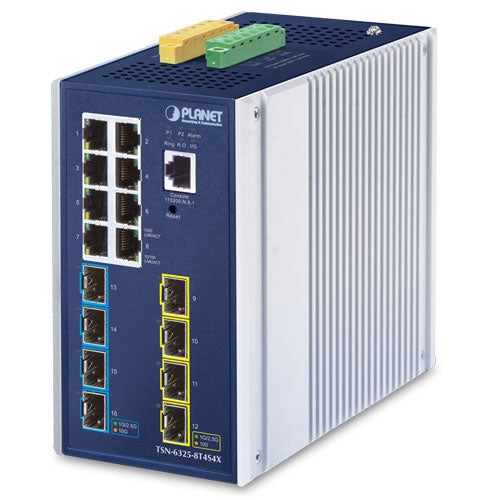
Planet
Planet TSN-6325-8T4S4X IP30 DIN-rail Industrial L3 8-Port 10/100/1000T + 4-port 1G/
Choose options
Innovative Industrial TSN Ethernet Switch Guaranty Delivery of Time-Sensitive Data
PLANET TSN-6325-8T4S4X is a brand-new Industrial-grade Layer 3 Time-Sensitive Networking (TSN) Managed Ethernet Switch which features 8 10/100/1000BASE-T RJ45 ports, 4 1G/2.5GBASE-X SFP ports and 4 10GBASE-SR/LR SFP+ ports and Layer 3 IP routing in a rugged IP30 metal case for stable operation in heavy environments, address all levels of the industrial automation network, from the field bus to the factory backbone. And it guarantees end-to-end transmission of high-priority traffic with extremely low latency.
With 10Gbps fiber interfaces, the TSN-6325-8T4S4X can handle extremely large amounts of data in a secure topology linking to an industrial backbone, 5G NR base station or Wi-Fi6/6E wireless AP. The TSN-6325-8T4S4X is capable of providing non-blocking switch fabric and wire-speed throughput as high as 116Gbps in the temperature range from -40 to 75 degrees C. It greatly simplifies the tasks of upgrading the industrial LAN for catering to increasing bandwidth demands.
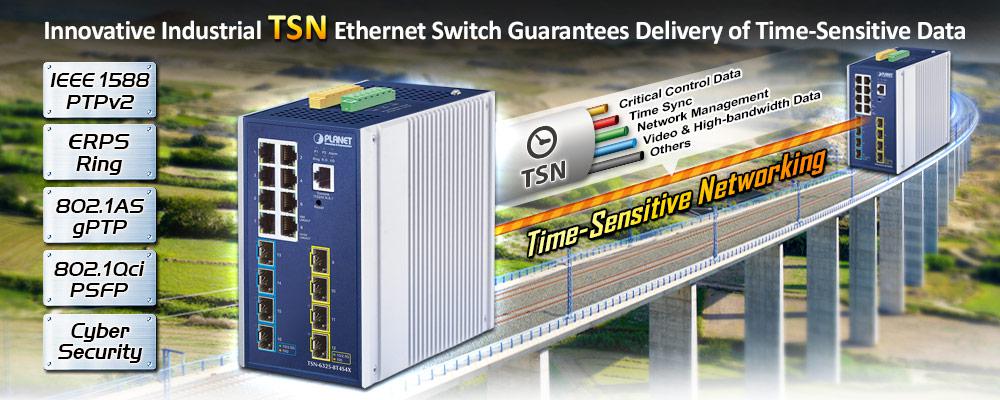
A Simplified Pathway to a TSN-compatible Infrastructure
PLANET TSN-6325-8T4S4X provides real-time, low-latency network communication for industrial automation, 5G NR networks, Industry 4.0, 4K/8K video streaming, and VR/AR gaming industry by using the Time-sensitive Networking (TSN) technology and IEEE 1588 Precision Time Protocol (PTPv2) for time synchronization on all ports.
The TSN-6325-8T4S4X supports TSN IEEE standards needed for a complete real-time communication solution. These include IEEE 802.1AS-REV profile for time synchronization, IEEE 802.1Qbv Enhancements for Scheduled Traffic, IEEE 802.1Qbu Frame Preemption, IEEE 802.3br Interspersing Express Traffic (IET), IEEE 802.1Qci for per-stream filtering and policing (PSFP) and IEEE 802.1CB frame replication and elimination for reliability (FRER) for seamless redundancy.
The TSN-6325-8T4S4X eliminates the need for separating information technology (IT) and operational technology (OT) Ethernet networks, providing a more ubiquitous approach to synchronization and precision timing for today’s industrial automation systems.
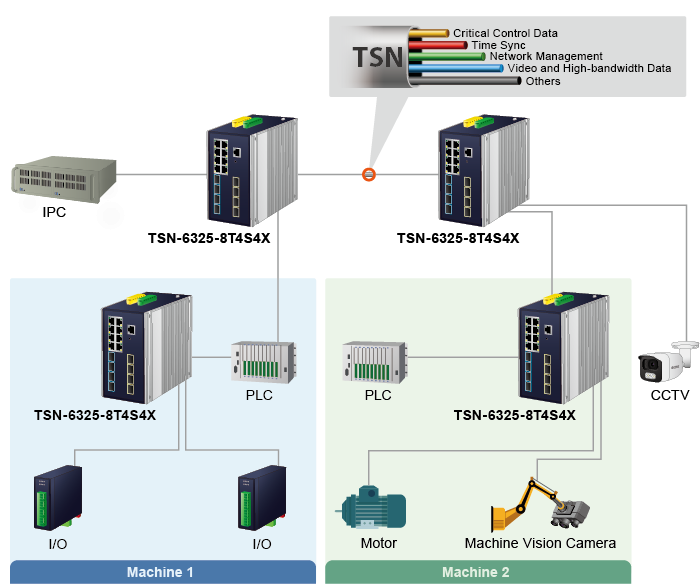
1588 Time Protocol for Industrial Computing Networks
The TSN-6325-8T4S4X features IEEE 1588v2 PTP (Precision Time Protocol) with hardware-based time stamping for precise time synchronization of networks, and support for Boundary Clock, End to End and Peer to Peer Transparent Clock modes. It is ideal for telecom and carrier Ethernet applications, supporting MEF service delivery and timing over packet solutions for IEEE 1588 and synchronous Ethernet.
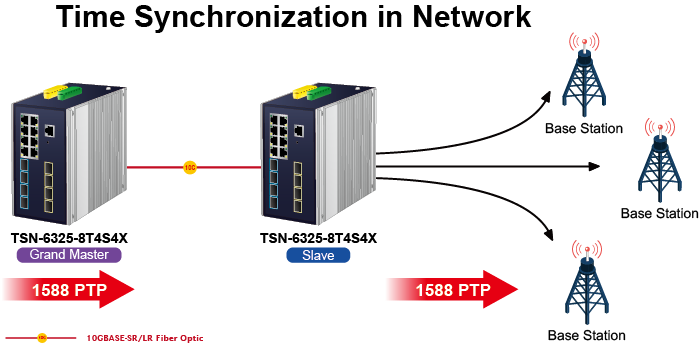
10GBASE-X SFP+ High-bandwidth Interfaces for Diversified Bandwidth Applications
The TSN-6325-8T4S4X has the capability to reach a high speed of 10Gbps over fiber-optic cabling which helps to accelerate the performance of large data transmission.
The fiber-optic 10GBASE-X SFP+ interfaces support triple speeds, 10GBASE-SR/LR, 2500BASE-X and 1000BASE-SX/LX, meaning the administrator now can flexibly choose the suitable SFP/SFP+ transceiver according to the transmission distance or the transmission speed required to extend the network efficiently. The TSN-6325-8T4S4X provides broad bandwidth and powerful processing capacity.
Redundant Ring, Fast Recovery for Critical Network Applications
The TSN-6325-8T4S4X supports redundant ring technology and features strong, rapid self-recovery capability to prevent interruptions and external intrusions. It incorporates advanced ITU-T G.8032 ERPS (Ethernet Ring Protection Switching) technology, Spanning Tree Protocol (802.1s MSTP), and redundant power input system into customer’s industrial automation network to enhance system reliability and uptime in harsh factory environments. In a simple ring network, the recovery time of data link can be as fast as 10ms.
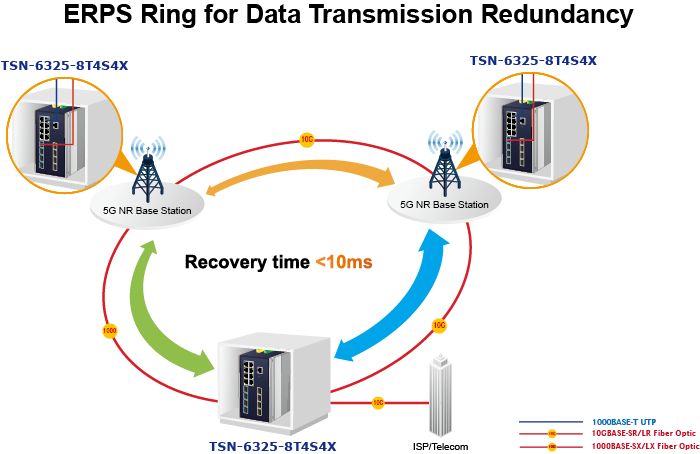
Layer 3 Routing Support
The TSN-6325-8T4S4X enables the administrator to conveniently boost network efficiency by configuring Layer 3 IPv4/IPv6 VLAN static routing manually, the RIP (Routing Information Protocol) or OSPF (Open Shortest Path First) settings automatically.
The RIP can employ the hop count as a routing metric and prevent routing loops by implementing a limit on the number of hops allowed in a path from the source to a destination.
The OSPF is an interior dynamic routing protocol for autonomous system based on link state. The protocol creates a database for link state by exchanging link states among Layer 3 switches, and then uses the Shortest Path First algorithm to generate a route table based on that database.
Robust Layer 2 Features
The TSN-6325-8T4S4X can be programmed for advanced Layer 2 switch management functions such as dynamic port link aggregation, 802.1Q tagged VLAN, Q-in-Q VLAN, private VLAN, Multiple Spanning Tree Protocol (MSTP), Layer 2 to Layer 4 QoS, bandwidth control, IGMP snooping and MLD snooping. Via the aggregation of supporting ports, the TSN-6325-8T4S4X allows the operation of a high-speed trunk group that comes with multiple ports and supports fail-over as well.

Cybersecurity Network Solution to Minimize Security Risks
The TSN-6325-8T4S4X comes with enhanced cybersecurity to fend off cyberthreats and cyberattacks. It supports SSHv2 and TLSv1.2 protocols to provide strong protection against advanced threats. Served as a key point to transmit data over a long-distance fiber optic cable to customer's critical equipment in a business network, the cybersecurity feature of the TSN-6325-8T4S4X protects the switch management and enhances the security of the mission-critical network without any extra deployment cost and effort.
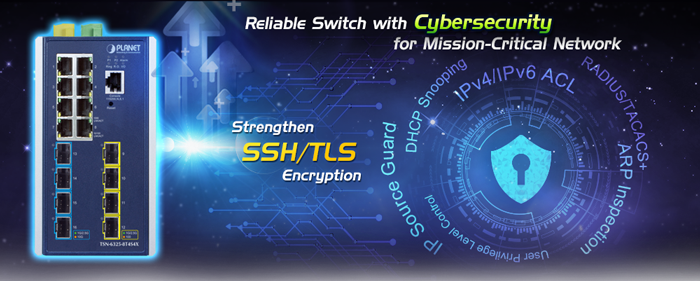
Modbus TCP Provides Flexible Network Connectivity for Factory Automation
With the supported Modbus TCP/IP protocol, the TSN-6325-8T4S4X can easily integrate with SCADA systems, HMI systems and other data acquisition systems in factory floors. It enables administrators to remotely monitor the industrial Ethernet switch’s operating information, port information, communication status, and DI and DO status, thus easily achieving enhanced monitoring and maintenance of the entire factory.
SMTP/SNMP Trap Event Alert
The TSN-6325-8T4S4X provides event alert function to help to diagnose the abnormal device owing to whether or not there is a break of the network connection, or the rebooting response.
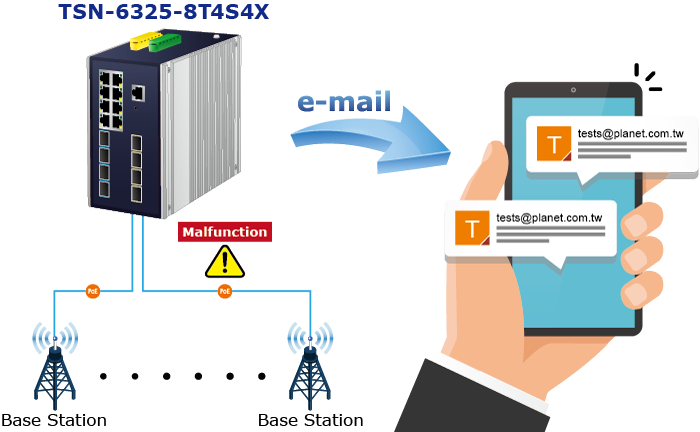
Effective Alarm Alert for Better Protection
The TSN-6325-8T4S4X supports a Fault Alarm feature which can alert the users when there is something wrong with the switches. With this ideal feature, the users would not have to waste time to find where the problem is. It will help to save time and human resource.
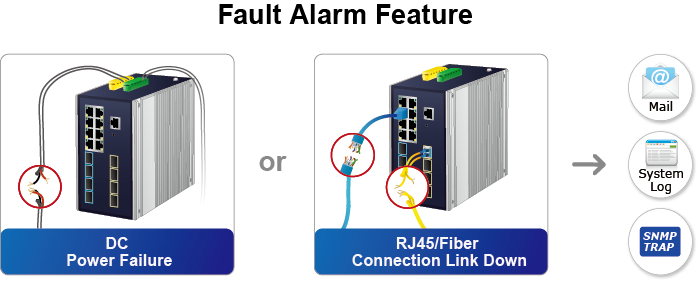
Digital Input and Digital Output for External Alarm
The TSN-6325-8T4S4X supports Digital Input and Digital Output on its front panel. This external alarm enables users to use Digital Input to detect and log external device status (such as door intrusion detector), and send event alarm to the administrators. The Digital Output could be used to alarm the administrators if the TSN-6325-8T4S4X’s port shows link down, link up or power failure.
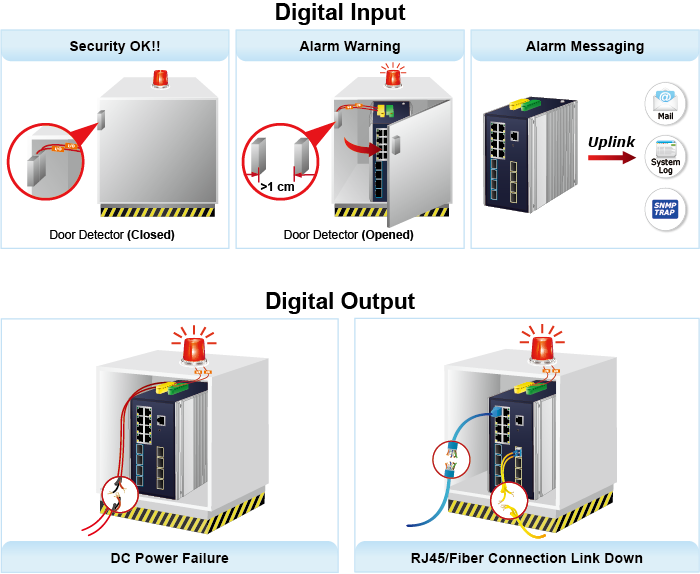
IPv6/IPv4 Dual Stack
Supporting both IPv6 and IPv4 protocols, the TSN-6325-8T4S4X helps data centers, campuses, telecoms, and more to experience the IPv6 era with the lowest investment as its network facilities need not be replaced or overhauled if the IPv6 FTTx edge network is set up.
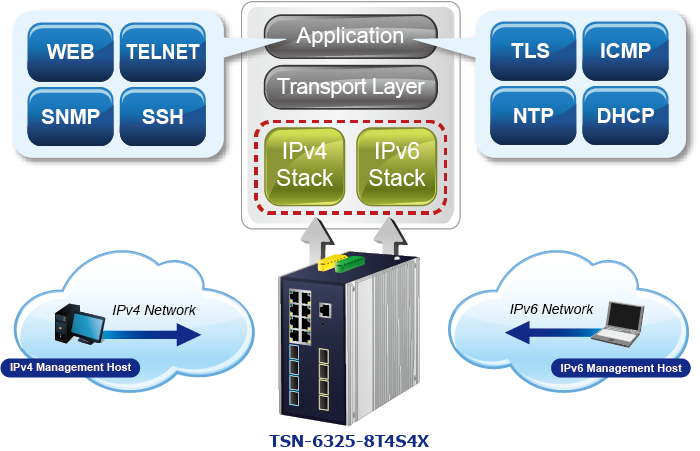
Efficient Management
For efficient management, the TSN-6325-8T4S4X is equipped with console, Web and SNMP management interfaces.
- With the built-in Web-based management interface, the TSN-6325-8T4S4X offers an easy-to-use, platform-independent management and configuration facility.
- For text-based management, it can be accessed via Telnet and the console port.
- For standard-based monitor and management software, it offers SNMPv3 connection which encrypts the packet content at each session for secure remote management.

Powerful Network Security
The TSN-6325-8T4S4X offers comprehensive Layer 2 to Layer 4 Access Control List (ACL) for enforcing security to the edge. It can be used to restrict network access by denying packets based on source and destination IP address, TCP/UDP ports or defined typical network applications. Its protection mechanism also comprises 802.1X Port-based and MAC-based user and device authentication. With the private VLAN function, communication between edge ports can be prevented to ensure user privacy.
Advanced IP Network Protection
The TSN-6325-8T4S4X also provides DHCP Snooping, IP Source Guard and Dynamic ARP Inspection functions to prevent IP snooping from attack and discard ARP packets with invalid MAC address. The network administrators can now construct highly-secure corporate networks with considerably less time and effort than before.
Excellent Traffic Control
The TSN-6325-8T4S4X is loaded with powerful traffic management and QoS features to enhance connection services by telecoms and ISPs. The QoS features include wire-speed Layer 4 traffic classifiers and bandwidth limit that are particularly useful for multi-tenant units, multi-business units, Telco and network service providers’ applications. It also empowers the industrial environment to take full advantage of the limited network resources and guarantees the best performance in VoIP and video conferencing transmission.
Intelligent SFP Diagnosis Mechanism
The TSN-6325-8T4S4X supports SFP-DDM (digital diagnostic monitor) function that greatly helps network administrator to easily monitor real-time parameters of the SFP and SFP+ transceivers, such as optical output power, optical input power, temperature, laser bias current, and transceiver supply voltage.
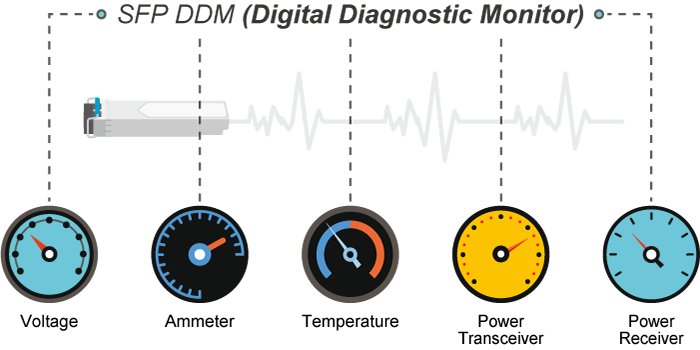
Physical Port
- 8 10/100/1000BASE-T RJ45 copper ports
- 4 1000/2500BASE-X SFP slots for SFP type auto detection
- 4 10GBASE-SR/LR SFP+ slots, compatible with 1000BASE-X and 2500BASE-X SFP
- One RJ45-to-RS232 console interface for basic management and setup
Industrial Hardened Design
- Dual power input, redundant power with reverse polarity protection
- DC 9 to 48V input or AC 24V input
- Active-active redundant power failure protection
- Backup of catastrophic power failure on one supply
- Fault tolerance and resilience
- DIN-rail and wall-mountable designs
- IP30 aluminum case
- Supports 6000V DC Ethernet ESD protection
- -40 to 75 degrees C operating temperature
Digital Input and Digital Output
- 2 digital input (DI)
- 2 digital output (DO)
- Integrates sensors into auto alarm system
- Transfers alarm to IP network via email and SNMP trap
Time Sensitive Networking
-
High Precision Time Synchronization
- IEEE1588 (Time Stamping)
- 802.1AS-Rev gPTP default profile
-
Shapers
- 802.1Qbv Enhancements for Scheduled Traffic
- 802.1Qch (Cyclic Queuing and Forwarding)
-
TSN Stream Policing
- 802.1Qci (Per Stream Filtering and Policing)
-
Redundancy
- 802.1CB FRER for seamless redundancy
- Also standard Linear and Ring protection
-
Delay Reduction
- IEEE 802.1Qbu Frame Preemption,
- IEEE 802.3br Interspersing Express Traffic (IET)
Layer 3 IP Routing Features
- IPv4 dynamic routing protocol supports RIPv2 and OSPFv2 and IPv6 OSPFv3
- IPv6 dynamic routing protocol supports OSPFv3
- IPv4/IPv6 hardware static routing
- Routing interface provides per VLAN routing mode
Layer 2 Features
- High performance of Store-and-Forward architecture, and runt/CRC filtering eliminates erroneous packets to optimize the network bandwidth
- Storm control support
- Broadcast/Multicast/Unknown unicast
- Supports VLAN
- IEEE 802.1Q tagged VLAN
- Supports provider bridging (VLAN Q-in-Q IEEE 802.1ad)
- Private VLAN Edge (PVE)
- Protocol-based VLAN
- MAC-based VLAN
- Voice VLAN
- GVRP (GARP VLAN Registration Protocol)
- Supports Spanning Tree Protocol
- IEEE 802.1D Spanning Tree Protocol (STP)
- IEEE 802.1w Rapid Spanning Tree Protocol (RSTP)
- IEEE 802.1s Multiple Spanning Tree Protocol (MSTP), spanning tree by VLAN
- BPDU Guard
- Supports Link Aggregation
- 802.3ad Link Aggregation Control Protocol (LACP)
- Cisco ether-channel (static trunk)
- Maximum 8 trunk groups, with 16 ports for each trunk
- Provides port mirror (many-to-1)
- Port mirroring to monitor the incoming or outgoing traffic on a particular port
- Loop protection to avoid broadcast loops
- Link Layer Discovery Protocol (LLDP)
- Compatible with Cisco uni-directional link detection(UDLD) that monitors a link between two switches and blocks the ports on both ends of the link if the link fails at any point between the two devices
- Supports G.8032 ERPS (Ethernet Ring Protection Switching)
- IEEE 1588v2 PTP (Precision Time Protocol)
- Features IEEE 802.1AS Time Synchronization, IEEE 802.1Qbu Frame Preemption, IEEE 802.1Qbv Enhancements for Scheduled Traffic and IEEE 802.1CB Seamless Redundancy
Quality of Service
- Ingress shaper and egress rate limit per port bandwidth control
- 8 priority queues on all switch ports
- Traffic classification
- IEEE 802.1p CoS
- ToS/DSCP/IP Precedence of IPv4/Ipv6 packets
- IP TCP/UDP port number
- Typical network application
- Strict priority and Weighted Round Robin (WRR) CoS policies
- Supports QoS and In/Out bandwidth control on each port
- Traffic-policing on the switch port
- DSCP remarking
- Voice VLAN
Multicast
- Supports IPv4 IGMP snooping v1, v2 and v3
- Supports IPv6 MLD snooping v1 and v2
- Querier mode support
- IPv4 IGMP snooping port filtering
- IPv6 MLD snooping port filtering
- MVR (Multicast VLAN Registration)
Security
- Authentication
- IEEE 802.1x port-based/MAC-based network access authentication
- IEEE 802.1x authentication with guest VLAN
- Built-in RADIUS client to cooperate with the RADIUS servers
- RADIUS/TACACS+ users access authentication
- Guest VLAN assigns clients to a restricted VLAN with limited services
- Access Control List
- IP-based Access Control List (ACL)
- MAC-based Access Control List (ACL)
- Source MAC/IP address binding
- DHCP Snooping to filter distrusted DHCP messages
- Dynamic ARP Inspection discards ARP packets with invalid MAC address to IP address binding
- IP Source Guard prevents IP spoofing attacks
- IP address access management to prevent unauthorized intruder
Management
- IPv4 and IPv6 dual stack management
- Switch Management Interfaces
- Console and Telnet Command Line Interface
- HTTP web switch management
- SNMP v1 and v2c switch management
- SSHv2, TLSv1.2 and SNMPv3 secure access
- SNMP Management
- Four RMON groups (history, statistics, alarms, and events)
- SNMP trap for interface Link Up and Link Down notification
- IPv6 IP address/NTP/DNS management
- Built-in Trivial File Transfer Protocol (TFTP) client
- BOOTP and DHCP for IP address assignment
- System Maintenance
- Firmware upload/download via HTTP
- Reset button for system reboot or reset to factory default
- Dual images
- DHCP Functions:
- DHCP Relay
- DHCP Option82
- DHCP Server
- User Privilege levels control
- Network Time Protocol (NTP)
- Network Diagnostic
- SFP-DDM (Digital Diagnostic Monitor)
- ICMPv6/ICMPv4 remote ping
- SMTP/Syslog remote alarm
- System Log
- PLANET Smart Discovery Utility for deployment management
- PLANET UNI-NMS (Universal Network Management) and CloudViewer app for deployment management
| Hardware Specifications | |
|---|---|
| Copper Ports | 8 10/100/1000BASE-T RJ45 auto-MDI/MDI-X ports |
| SFP Port | 4 1000/2500BASE-X SFP portsslot interfaces (Ports -9 to and Port-12) Compatible with 1000BASE-X and 2500BASE-X SFP transceiver |
| SFP+ Ports | 4 10GBASE-SR/LR SFP+ slots Backward compatible with 1000BASE-SX/LX/BX and 2500BASE-X SFP transceivers |
| Console | 1 x RJ45-to-RS232 serial port (115200, 8, N, 1) |
| Reset Button | < 5 sec: System reboot > 5 sec: Factory default |
| Connector | Removable 6-pin terminal block for power input Pin 1/2 for Power 1, Pin 3/4 for fault alarm, Pin 5/6 for Power 2 Removable 6-pin terminal block for DI/DO interface Pin 1/2 for DI 1 & 2, Pin 3/4 for DO 1 & 2, Pin 5/6 for GND |
| Alarm | One relay output for power failure. Alarm relay current carry ability: 1A @ 24V DC |
| Digital Input (DI) | 2 digital input: Level 0: -24~2.1V (±0.1V) Level 1: 2.1~24V (±0.1V) Input load to 24V DC, 10mA max. |
| Digital Output (DO) | 2 digital output: Open collector to 24VDC, 100mA |
| Enclosure | IP30 aluminum case |
| Installation | DIN-rail or wall mounting |
| SDRAM | 2048Mbytes |
| Flash Memory | 64Mbytes |
| Dimensions (W x D x H) | 86 x 135 x 152 mm |
| Weight | 1,597g |
| Power Requirements | DC 9~48V, 5A max. AC 24V, 2A max. |
| Power Consumption | DC input: Max. 16.8 watts/57.3BTU (system on) Max. 38.2 watts/130.3BTU (Full loading) AC 24V input: Max. 21.7 watts/74BTU (system on) Max. 30 watts/102.3BTU (Full loading) |
| ESD Protection | 5KV DC |
| Surge Protection | 6KV DC |
| LED Indicators | System: Power 1 (Green), Power 2 (Green) Fault Alarm (Red) Ring (Green), Ring Owner (Green) DIDO (Red) Per 10/100/1000T RJ45 Port: 1000Mbps LNK/ACT (Green) 10/100Mbps LNK/ACT (Amber) Per SFP Port: 1G/2.5Gbps LNK/ACT (Green) Per SFP+ Port: 1G/2.5Gbps LNK/ACT (Green) 10Gbps LNK/ACT (Amber) |
| Switching Specifications | |
| Switch Architecture | Store-and-Forward |
| Switch Fabric | 116Gbps/non-blocking |
| Throughput | 86.3Mpps@64Bytes |
| Address Table | 32K entries, automatic source address learning and aging |
| Shared Data Buffer | 32Mbits |
| Jumbo Frame | 10K bytes |
| Flow Control | IEEE 802.3x pause frame for full duplex Back pressure for half duplex |
| Layer 3 Functions | |
| IP Interfaces | Max. 128 VLAN interfaces |
| Routing Table | Max. 512 static route entries Max. 3072 routing table entries |
| Routing Protocols | IPv4 RIPv2 IPv4 OSPFv2 IPv6 OSPFv3 IPv4 hardware static routing IPv6 hardware static routing |
| Layer 2 Functions | |
| Port Configuration | Port disable/enable Auto-negotiation 10/100/1000Mbps full and half duplex mode selection Flow control disable/enable Port link capability control |
| Port Status | Display each port’s speed duplex mode, link status, flow control status, auto-negotiation status, trunk status |
| Port Mirroring | TX/RX/Both Many-to-1 monitor Mirror – Remote Switched Port Analyzer (Cisco RSPAN) Supports up to 5 sessions |
| VLAN | IEEE 802.1Q tagged VLAN IEEE 802.1ad Q-in-Q tunneling Private VLAN Edge (PVE) MAC-based VLAN Protocol-based VLAN Voice VLAN IP Subnet-based VLAN MVR (Multicast VLAN registration) GVRP Up to4K VLAN groups, out of 4095 VLAN IDs |
| Link Aggregation | IEEE 802.3ad LACP/static trunk 8 trunk groups with 16 ports per trunk group |
| Spanning Tree Protocol | IEEE 802.1D Spanning Tree Protocol IEEE 802.1w Rapid Spanning Tree Protocol IEEE 802.1s Multiple Spanning Tree Protocol Supports 7 MSTP instances BPDU Guard, BPDU filtering and BPDU transparent Root Guard |
| IGMP Snooping | IPv4 IGMP (v1/v2/v3) snooping IPv4 IGMP querier mode support Supports 255 IGMP groups |
| MLD Snooping | IPv6 MLD (v1/v2) snooping, IPv6 MLD querier mode support Supports 255 MLD groups |
| Bandwidth Control | Per port bandwidth control Ingress: 10Kbps~13128Mbps Egress: 10Kbps~13128Mbps |
| Ring | Supports ERPS, and complies with ITU-T G.8032 Recovery time < 10ms @ 3 nodes Recovery time <50ms @ 16 nodes Supports Major ring and sub-ring |
| Synchronization | IEEE 1588v2 PTP(Precision Time Protocol) PTP Master PTP Slave Boundary clock Peer-to-peer transparent clock End-to-end transparent clock |
| QoS | Traffic classification based, strict priority and WRR 8-level priority for switching: Port number 802.1p priority 802.1Q VLAN tag DSCP/ToS field in IP packet |
| Time-Sensitive Networking Protocols |
High Precision Time Synchronization IEEE1588 (Time Stamping) 802.1AS-Rev gPTP default profile Shapers 802.1Qbv (Time-aware Scheduling) 802.1Qch (Cyclic Queuing and Forwarding) TSN Stream Policing 802.1Qci (Per Stream Filtering and Policing) Redundancy 802.1CB ( Frame Replication and Elimination for Redundancy for seamless redundancy) Also standard Linear and Ring protection Delay Reduction EEE 802.1Qbu Frame Preemption IEEE 802.3br Interspersing Express Traffic (IET) |
| Security Functions | |
| Access Control List | IP-based ACL/MAC-based ACL ACL based on: MAC Address IP Address Ethertype Protocol Type VLAN ID DSCP 802.1p Priority Up to 512 entries |
| Security | Port security IP source guard, up to 512 entries Dynamic ARP inspection, up to 1K entries Command line authority control based on user level Static MAC address, up to 64 entries |
| AAA | RADIUS client TACACS+ client |
| Network Access Control | IEEE 802.1x port-based network access control MAC-based authentication Local/RADIUS authentication |
| Management | |
| Basic Management Interfaces | Console; Telnet; Web browser; SNMP v1, v2c |
| Secure Management Interfaces | SSHv2, TLSv1.2, SNMPv3 |
| System Management | Firmware upgrade by HTTP protocol through Ethernet network Configuration upload/download through HTTP Remote Syslog System log LLDP protocol NTP PLANET Smart Discovery Utility PLANET CloudViewer app |
| SNMP MIBs | RFC 1213 MIB-II RFC 1493 Bridge MIB RFC 1643 Ethernet MIB RFC 2863 Interface MIB RFC 2665 Ether-Like MIB RFC 2819 RMON MIB (Group 1, 2, 3 and 9) RFC 2737 Entity MIB RFC 2618 RADIUS Client MIB RFC 2863 IF-MIB RFC 2933 IGMP-STD-MIB RFC 3411 SNMP-Frameworks-MIB RFC 4292 IP Forward MIB RFC 4293 IP MIB RFC 4836 MAU-MIB IEEE 802.1X PAE LLDP |
| Standards Conformance | |
| Regulatory Compliance | FCC Part 15 Class A CE: EN55032 EN55035 |
| Stability Testing | EC60068-2-32 (free fall) IEC60068-2-27 (shock) IEC60068-2-6 (vibration) |
| Standards Compliance | IEEE 802.3 10BASE-T IEEE 802.3u 100BASE-TX/100BASE-FX IEEE 802.3z Gigabit SX/LX IEEE 802.3ab Gigabit 1000T IEEE 802.3ae 10Gb/s Ethernet IEEE 802.3bz 2.5GBASE-X IEEE 802.3x flow control and back pressure IEEE 802.3ad port trunk with LACP IEEE 802.1D Spanning Tree Protocol IEEE 802.1w Rapid Spanning Tree Protocol IEEE 802.1s Multiple Spanning Tree Protocol IEEE 802.1p Class of Service IEEE 802.1Q VLAN tagging IEEE 802.1X Port Authentication Network Control IEEE 802.1ab LLDP IEEE 802.3ah OAM IEEE 802.1ag Connectivity Fault Management (CFM) IEEE 802.1AS - Timing and Synchronization for Time-sensitive Applications IEEE 802.1Qbu Frame Preemption, IEEE 802.3br Interspersing Express Traffic (IET) IEEE 802.1Qci Per-Stream Filtering and Policing (PSFP) IEEE 802.1Qbv Enhancements for Scheduled Traffic IEEE 802.1CB Frame Replication and Elimination for Reliability (FRER) RFC 768 UDP RFC 783 TFTP RFC 791 IP RFC 792 ICMP RFC 2068 HTTP RFC 1112 IGMP v1 RFC 2236 IGMP v2 RFC 3376 IGMP v3 RFC 2710 MLD v1 RFC 3810 MLD v2 RFC 2328 OSPF v2 RFC 5340 OSPF v3 RFC 2453 RIP v2 ITU-T G.8032 ERPS Ring |
| Environment | |
| Operating | -40 ~ 75 degrees C |
| Storage | -40 ~ 85 degrees C |
| Humidity | 5 ~ 95% (non-condensing) |




